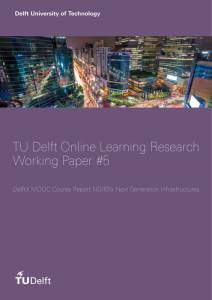Recent News
- Exploring Personal Experience and Value Creation in Postdigital Education: Insights from a Large-Scale MOOC Survey.
- Debugging the Divide: Exploring Men’s and Women’s Motivations and Engagement in Computer Science MOOCs
- Data for Learning in Engineering Education
- Data Driven Course Improvement – Pitch Presentation LCDA
- Enhancing quality assurance in continuing education through an organisational cultural change
Tags
Archives
- September 2024
- June 2024
- January 2024
- December 2023
- November 2023
- June 2023
- March 2023
- September 2022
- July 2022
- May 2022
- March 2022
- September 2021
- August 2021
- July 2021
- October 2019
- June 2019
- May 2019
- July 2018
- January 2018
- April 2017
- February 2017
- December 2016
- October 2016
- August 2016
- June 2016
- May 2016
- April 2016
- February 2016
- July 2015
- May 2015
- April 2015
- March 2015
- September 2014
- August 2014
- September 2013
Meta information
- TU Delft>
- TU Weblog>
- Online Learning Research>
- Working Paper 5: Next Generation Infrastructures 2014
Working Paper 5: Next Generation Infrastructures 2014
 This report is to give more insight in the background, the implementation of the course and the results. The purpose is to provide useful information (and clean data) to the team of developers and teachers and to others to support their aspiration to improve online education. A comparative analysis of the first five DelftX MOOCs can be found in the ‘Working Paper DelftX MOOCs, the first year (2013-2014)’.
This report is to give more insight in the background, the implementation of the course and the results. The purpose is to provide useful information (and clean data) to the team of developers and teachers and to others to support their aspiration to improve online education. A comparative analysis of the first five DelftX MOOCs can be found in the ‘Working Paper DelftX MOOCs, the first year (2013-2014)’.
Summary
The course originated from the encompassing 10 year THE research program on New Generation Infrastructures, and covered the general discussion on infrastructural systems in the world with the purpose to develop a broad understanding. Most assignments revolved around authentic world-problems to provide a good balance between theory and examples. One of the achievements was the collective development of a World map on infrastructures, where students contributed with an array of materials.
The course was intended as highly collaborative, and as an opportunity for crowd-sourced knowledge about the world infra-systems. The design of the course showed a constructivist orientation, was learner oriented and had a certain degree of student autonomy. This is slightly different from the regular xMOOC, which use in most instances a more instructionist approach focusing on knowledge transfer. The different pedagogy put pressure on the appropriate handling of feedback, assessment, and peer reviews. Nevertheless the experiential character of the course made it a very daring process and the approach was perceived as a well-curated online course with high class content.
Reference
De Vries, P., Hennis, T., Skrypnyk, A., (2015). TU Delft Online Learning Research Working Paper #1:DelftX MOOC Course Report NGI101x Next Generation Infrastructures. Delft, Delft University of Technology. ISBN: 9789461864604.





















Comments are closed.